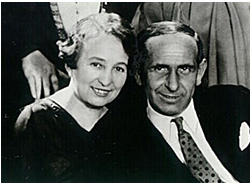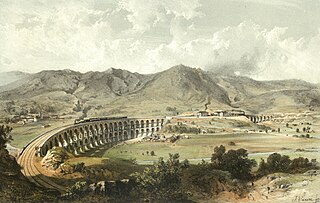
Maximilian Steiner was an Austrian actor and theater director and manager. He is known particularly for his leadership of Vienna's Theater an der Wien from 1869 to 1880, a period during which the theater reduced the importance of folk plays and was prominent in developing and promoting the fashion of a Viennese style of operetta.

Johann Josef Wenzel Anton Franz Karl, Graf Radetzky von Radetz was a Czech nobleman and Austrian field marshal. He served as chief of the general staff in the Habsburg monarchy during the later period of the Napoleonic Wars and afterwards began military reforms. A disciplined and fair man, he was so beloved by his troops that he was known as Vater ('Father') Radetzky. He is best known for the victories at the Battles of Custoza and Novara during the First Italian War of Independence.

Ludwig Anzengruber was an Austrian dramatist, novelist and poet. He was born and died in Vienna, Austria.

Nikolaus Alois Maria Vinzenz Negrelli, Ritter von Moldelbe was a Tyrolean civil engineer and railroad pioneer mostly active in parts of the Austrian Empire, Switzerland, Germany and Italy.

Luise Fleck, also known as Luise Kolm or Luise Kolm-Fleck, née Louise or Luise Veltée, was an Austrian film director, and considered the second ever female feature film director in the world, after Alice Guy-Blaché. Her son, Walter Kolm-Veltée, was also a noted film director.

Maria Stona; Marie Scholz; born Stonawski (1859–1944) was a Silesian German writer and poet. Her daughter was the sculptor Helen Zelezny-Scholz.

Anton Bettelheim was an Austrian critic and journalist.
The Austrian Tourist Club or ÖTK is the second oldest and third largest Alpine club in Austria.
Der Pfarrer von Kirchfeld is an anti-clerical folkplay by Ludwig Anzengruber in Viennese dialect, first produced 5 November 1870 in Vienna. It is Anzengruber's most popular drama.
Wiener Schachzeitung was the name of several Austrian chess periodicals published in Vienna between 1855 and 1949.

Heinrich Mataja was an Austrian lawyer and politician of the Christian Social Party.

The Lurgrotte karst cave is the largest cave in the Eastern Alps of Styria, Austria. It is located about 16 km (9.9 mi) north of Graz and crosses the Tannenben karst region. The cave has two accessible entrances, one at the village of Semriach and the other at the village of Peggau. At the Semriach entrance, the Lur River sinks into the cave. At the Peggau entrance, the Schmelz River emerges from within the cave, flowing to the west and eventually joining the Mur River.

Hans Duhan was an Austrian operatic baritone. He belonged to the ensemble of the Vienna State Opera for 26 years and was the first Count Almaviva and the first Papageno of the Salzburg Festival.

Ignaz Schnitzer was an Austrian famous writer, journalist, translator, librettist and newspaper founder of Hungarian origin.

Wilhelm Wiesberg, real name Wilhelm Bergamenter, was an Austrian writer and folksinger.

The Austrian Southern Railway (German: is a 577.2 km long double track railway, which linked the capital Vienna with Trieste, former main seaport of the Austro-Hungarian Monarchy, by railway for the first time. It now forms the Southern Railway in Austria and the Spielfeld-Straß–Trieste railway in Slovenia and Italy.

Der Humorist was a journal published from 1837 to 1926 with the title "eine Zeitschrift für Scherz und Ernst, Kunst, Theater, Geselligkeit und Sitte". In the years 1837 to 1848, Der Humorist was published without any further addition. Afterwards with "ein Volksblatt für alle Interessen des Rechts und des Lichts, für Leben und Kunst, für Ernst, Scherz und Satyre, nebst bildlichen, satyrischen Beilagen unter dem Titel: Karikaturen-Album".

Ludwig Speidel was a German writer, which in the second half of the 19th century was the leading music, theater and literary critic in Vienna.

Gustav Jahn was an Austrian landscape painter, poster artist and mountaineer.
















